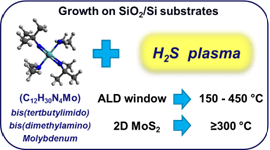Introducing the FlexAL-2D the ALD Plasma Processing System for 2D Materials
Jul 14 2017
Oxford Instruments’ ALD and 2D technical specialists have teamed up with Eindhoven University of Technology research teams to develop the innovative FlexAL-2D for atomic layer deposition (ALD) of 2D transition metal dichalcogenides for nanodevice applications.

The FlexAL-2D ALD system offers a number of benefits for growth of 2D materials:
- 2D materials growth:
- At CMOS compatible temperatures
- With precise digital thickness control
- Over a large area (200mm wafers)
- Robust ALD processes for 2D materials:
- Self-limiting ALD growth
- MoS2:
- Oxygen and carbon free (<2%)
- High growth per cycle ~0.1 nm/cycle
- Crystalline material above 300°C
- Tunable morphology: Control over basal plane or edge plane orientation
- Growth of ALD dielectrics & other ALD layers on 2D materials in one tool
- create advanced 2D device structures
- RF substrate biasing option for film property control
Dr. Bol and the Plasma & Materials Processing (PMP) group at TU/e are pushing the boundaries of ALD research into new application areas. 2D materials are a hot topic and utilising ALD to allow growth at lower temperatures and combine 2D materials with ALD deposition and other processing methods at 200 mm provide a new capability with many possibilities.
Chris Hodson, ALD Product Manager at Oxford Instruments Plasma Technology
The wide parameter space offered by the FlexAL-2D ALD system allows growth of 2D transition-metal dichalcogenides at lower temperatures than employed in CVD furnaces. First results on the growth of 2D MoS2 material by ALD at 450°C and lower temperatures will be presented on July 16th 2017 by Eindhoven researchers at the ALD conference in Denver. Plasma-enhanced ALD was implemented to synthesize layers of 2D MoS2 films with tuneable morphologies i.e. in-plane and vertically standing nano-scale architectures on CMOS compatible SiO2/Si substrates. The 2D in-plane morphology has potential applications in nanoelectronics, while the 3D fin structures are ideal for catalysis applications such as water splitting.
We are excited about the results from the new ALD FlexAL configuration from Oxford Instruments, which has been configured to meet our needs.” Bol explains. The researchers are particularly interested in relatively low temperatures. “For CVD processes, typically temperatures of over a 800 degrees Celsius are needed. That is often fatal for applications in semiconductors because the high temperature increases the diffusion of the atoms, which makes it harder to place them at the right spot. We want to have a process that yields materials of high quality at lower temperatures. This is especially important for the two-dimensional heterogeneous layers I am working on, since at lower temperatures less diffusion of atoms between the layers will occur.
Dr. Ageeth Bol
We're committed to providing free access to quality science. By registering and providing insight into
your preferences you're joining a community of over 1m science interested individuals and help us to
provide you with insightful content whilst keeping our service free.
or
Terms
While we only use edited and approved content for Azthena
answers, it may on occasions provide incorrect responses.
Please confirm any data provided with the related suppliers or
authors. We do not provide medical advice, if you search for
medical information you must always consult a medical
professional before acting on any information provided.
Your questions, but not your email details will be shared with
OpenAI and retained for 30 days in accordance with their
privacy principles.
Please do not ask questions that use sensitive or confidential
information.
Read the full Terms & Conditions.